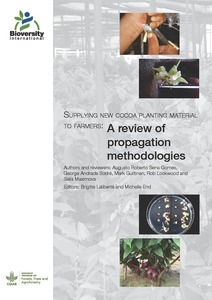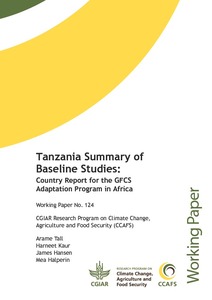Seed Unit Annual Report : 1990
Smallholder Farmers’ Perceptions on Climate Change and the Use of Sustainable Agricultural Practices in the Chinyanja Triangle, Southern Africa
In developing regions with high levels of poverty and a dependence on climate sensitive agriculture, studies focusing on climate change adaptation, planning, and policy processes, have gained relative importance over the years. This study assesses the impact of farmer perceptions regarding climate change on the use of sustainable agricultural practices as an adaptation strategy in the Chinyanja Triangle, Southern Africa.
Setting up agricultural water management interventions - learning from successful case studies in the Volta and Limpopo river basins
Long-term investments in agricultural water management (AWM) interventions in the Volta and Limpopo river basins have aimed at improving water availability and quality for smallholder farming systems. However, sustained and wider uptake of AWM technologies and approaches has not been as successful. We need to learn from successful AWM interventions, those interventions that have led to a sustained or increased uptake of AWM technologies or approaches, and which have led to improved well-being of farmers and livestock keepers in the rural development context of sub-Sahara Africa.
Solar irrigation pumps: can electricity buy-back curb groundwater over-use?
Groundwater pumping for irrigation has exploded across India since the 1970’s largely due to a proliferation of cheap pump sets and highly subsidized energy. In much of Western and peninsular India, aquifers have been overexploited with substantial decreases in water tables leading to even higher amounts of energy used for pumping. As solar irrigation pumps become more effective and affordable, the prospect of uncontrolled solar pumping further exacerbating the unsustainable use of groundwater has led to calls by some for the government to buy back excess electricity generated on farms.
Spatial decision support for selecting tropical crops and forages in uncertain environments.Thesis (Ph.D.)
Structure and performance of vegetable marketing in East Shoa Zone, Oromia Region, Ethiopia
Analysis of marketing performance of vegetable plays an important role in an ongoing or future market development plan. The study primarily examines market structure of major actors and assessing the market performance for key vegetable marketing actors and channels by quantifying costs and profit margins. The data was generated by household survey using pre-tested structured questionnaires. This was supplemented by secondary data collected from different published and unpublished sources.
Supplying new cocoa planting material to farmers: a review of propagation methodologies
The review, coordinated by Bioversity International, presents an impartial, evidence-based review of cacao propagation methods, to serve as a basis for the assessment and implementation of strategies for providing farmers with quality planting materials, adapted to current and future needs (cultural, institutional, technical, environmental and financial). It describes the various propagation methods available for the production and supply of large numbers of cacao plants to growers.
Tanzania Summary of Baseline Studies: Country Report for the GFCS Adaptation Program in Africa
This report reflects upon the consolidated findings from the baseline and scoping studies conducted under the auspices of Global Framework for Climate Services (GFCS) Adaptation Programme in Africa. It identifies gaps in climate information access and use at the local level, type of climate services farmers and pastoralists need in Tanzania, relevant channels to reach farmers with requested services, lead-time and gender specific requirements.
The effect of Indonesia's economic crisis on small farmers and natural forest cover in the outer islands
Twenty million people live in or near Indonesia' s natural forests. The country's humid tropical forests are primarily in Sumatra, Kalimantan, Sulawesi, and Irian Jaya. A devastating regional economic crisis that began in mid-1997 affected Indonesia more strongly than any other country in Asia. A random sample survey of 1050 households was conducted in six outer island provinces to understand the effects of the crisis on the well-being of forest villagers and on their agricultural and forest clearing practices.
The impact of investment in smallholder irrigation schemes on irrigation expansion and crop productivity in Malawi
Reliance on rainfall for agriculture and increased climate change and variability pose growing production risks in developing countries. Agriculture in Sub-Saharan Africa is dominated by smallholder farmers who depend mainly on rain-fed agriculture, putting food security at both household and national levels at risk, especially in the event of drought. Investment in smallholder irrigation becomes a priority in developing countries if food security and national development goals are to be met, as their economies are agro-based.
The 'Trickle Down' of IWRM: a case study of local-level realities in the Inkomati Water Management Area, South Africa
The historical legacy in South Africa of apartheid and the resulting discriminatory policies and power imbalances are critical to understanding how water is managed and allocated, and how people participate in designated water governance structures. The progressive post-apartheid National Water Act (NWA) is the principal legal instrument related to water governance which has broadly embraced the principles of Integrated Water Resources Management (IWRM).





